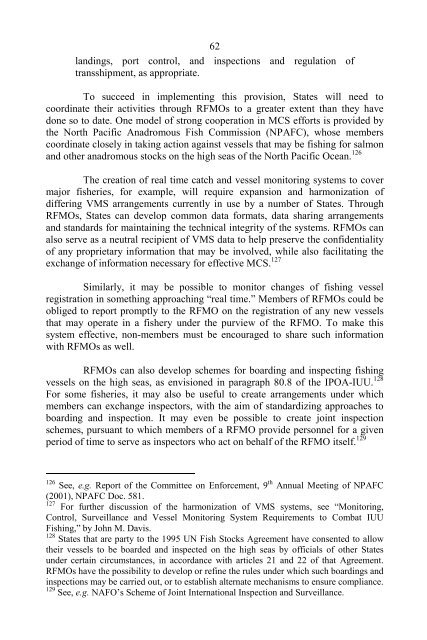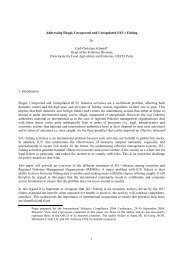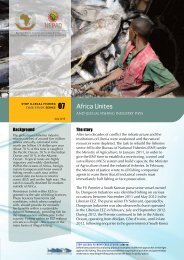Implementation of IPOA/IUU - International MCS Network
Implementation of IPOA/IUU - International MCS Network
Implementation of IPOA/IUU - International MCS Network
You also want an ePaper? Increase the reach of your titles
YUMPU automatically turns print PDFs into web optimized ePapers that Google loves.
62landings, port control, and inspections and regulation <strong>of</strong>transshipment, as appropriate.To succeed in implementing this provision, States will need tocoordinate their activities through RFMOs to a greater extent than they havedone so to date. One model <strong>of</strong> strong cooperation in <strong>MCS</strong> efforts is provided bythe North Pacific Anadromous Fish Commission (NPAFC), whose memberscoordinate closely in taking action against vessels that may be fishing for salmonand other anadromous stocks on the high seas <strong>of</strong> the North Pacific Ocean. 126The creation <strong>of</strong> real time catch and vessel monitoring systems to covermajor fisheries, for example, will require expansion and harmonization <strong>of</strong>differing VMS arrangements currently in use by a number <strong>of</strong> States. ThroughRFMOs, States can develop common data formats, data sharing arrangementsand standards for maintaining the technical integrity <strong>of</strong> the systems. RFMOs canalso serve as a neutral recipient <strong>of</strong> VMS data to help preserve the confidentiality<strong>of</strong> any proprietary information that may be involved, while also facilitating theexchange <strong>of</strong> information necessary for effective <strong>MCS</strong>. 127Similarly, it may be possible to monitor changes <strong>of</strong> fishing vesselregistration in something approaching “real time.” Members <strong>of</strong> RFMOs could beobliged to report promptly to the RFMO on the registration <strong>of</strong> any new vesselsthat may operate in a fishery under the purview <strong>of</strong> the RFMO. To make thissystem effective, non-members must be encouraged to share such informationwith RFMOs as well.RFMOs can also develop schemes for boarding and inspecting fishingvessels on the high seas, as envisioned in paragraph 80.8 <strong>of</strong> the <strong>IPOA</strong>-<strong>IUU</strong>. 128For some fisheries, it may also be useful to create arrangements under whichmembers can exchange inspectors, with the aim <strong>of</strong> standardizing approaches toboarding and inspection. It may even be possible to create joint inspectionschemes, pursuant to which members <strong>of</strong> a RFMO provide personnel for a givenperiod <strong>of</strong> time to serve as inspectors who act on behalf <strong>of</strong> the RFMO itself. 129126 See, e.g. Report <strong>of</strong> the Committee on Enforcement, 9 th Annual Meeting <strong>of</strong> NPAFC(2001), NPAFC Doc. 581.127 For further discussion <strong>of</strong> the harmonization <strong>of</strong> VMS systems, see “Monitoring,Control, Surveillance and Vessel Monitoring System Requirements to Combat <strong>IUU</strong>Fishing,” by John M. Davis.128 States that are party to the 1995 UN Fish Stocks Agreement have consented to allowtheir vessels to be boarded and inspected on the high seas by <strong>of</strong>ficials <strong>of</strong> other Statesunder certain circumstances, in accordance with articles 21 and 22 <strong>of</strong> that Agreement.RFMOs have the possibility to develop or refine the rules under which such boardings andinspections may be carried out, or to establish alternate mechanisms to ensure compliance.129 See, e.g. NAFO’s Scheme <strong>of</strong> Joint <strong>International</strong> Inspection and Surveillance.
















